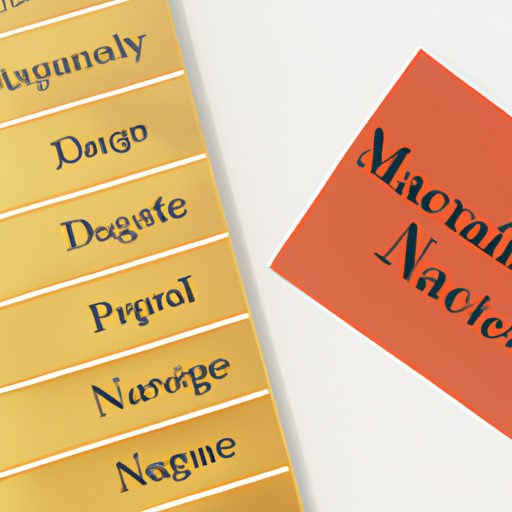

Title: Understanding Magnetic Product Standards: Ensuring Quality and Reliability

1. International Electrotechnical Commission (IEC) Standards (200 words) The International Electrotechnical Commission (IEC) is a globally recognized organization that develops and publishes international standards for electrical, electronic, and related technologies. Several IEC standards are relevant to magnetic products, including those related to magnetic materials, magnetic components, and magnetic devices. These standards cover aspects such as material composition, magnetic properties, performance testing, and safety requirements.
2. Magnetic Material Standards (300 words) Magnetic materials are the building blocks of various magnetic products. Standards for magnetic materials focus on their composition, magnetic properties, and performance characteristics. For example, the International Organization for Standardization (ISO) has developed standards for permanent magnets, specifying requirements for magnetic flux density, coercivity, and temperature stability. These standards ensure consistent quality and performance across different magnet types, such as neodymium, samarium cobalt, and ferrite magnets.
3. Magnetic Component Standards (400 words) Magnetic components, such as inductors, transformers, and magnetic sensors, are widely used in electronic devices and power systems. Standards for magnetic components address parameters like inductance, magnetic saturation, and temperature stability. The IEC 62317 series of standards, for instance, provides guidelines for the measurement and characterization of magnetic components, ensuring accurate and reliable performance.
4. Magnetic Device Standards (400 words) Magnetic devices encompass a wide range of products, including magnetic storage media, magnetic sensors, and magnetic resonance imaging (MRI) systems. Standards for magnetic devices cover aspects such as data storage density, signal-to-noise ratio, sensitivity, and safety. The International Magnetic Recording Standards Committee (IMRSC) develops standards for magnetic storage devices, ensuring compatibility and reliability across different storage technologies like hard disk drives and magnetic tapes.
5. Application-Specific Standards (200 words) Certain industries have specific standards for magnetic products due to their unique requirements. For example, the automotive industry has standards for magnetic sensors used in vehicle speed detection, anti-lock braking systems, and electronic stability control. Similarly, the medical industry has standards for magnetic resonance imaging (MRI) systems, ensuring patient safety, image quality, and compatibility with other medical devices.
Conclusion (100 words) Magnetic products are integral to numerous industries, and adherence to product standards is crucial to ensure their quality, reliability, and compatibility. International organizations like the IEC and ISO, along with industry-specific committees, develop and maintain these standards. By complying with these standards, manufacturers can guarantee consistent performance, safety, and interoperability of magnetic materials, components, and devices. Understanding and implementing these standards is essential for both manufacturers and end-users to ensure the successful integration and utilization of magnetic products in various applications.
Title: Understanding Magnetic Product Standards: Ensuring Quality and Reliability

1. International Electrotechnical Commission (IEC) Standards (200 words) The International Electrotechnical Commission (IEC) is a globally recognized organization that develops and publishes international standards for electrical, electronic, and related technologies. Several IEC standards are relevant to magnetic products, including those related to magnetic materials, magnetic components, and magnetic devices. These standards cover aspects such as material composition, magnetic properties, performance testing, and safety requirements.
2. Magnetic Material Standards (300 words) Magnetic materials are the building blocks of various magnetic products. Standards for magnetic materials focus on their composition, magnetic properties, and performance characteristics. For example, the International Organization for Standardization (ISO) has developed standards for permanent magnets, specifying requirements for magnetic flux density, coercivity, and temperature stability. These standards ensure consistent quality and performance across different magnet types, such as neodymium, samarium cobalt, and ferrite magnets.
3. Magnetic Component Standards (400 words) Magnetic components, such as inductors, transformers, and magnetic sensors, are widely used in electronic devices and power systems. Standards for magnetic components address parameters like inductance, magnetic saturation, and temperature stability. The IEC 62317 series of standards, for instance, provides guidelines for the measurement and characterization of magnetic components, ensuring accurate and reliable performance.
4. Magnetic Device Standards (400 words) Magnetic devices encompass a wide range of products, including magnetic storage media, magnetic sensors, and magnetic resonance imaging (MRI) systems. Standards for magnetic devices cover aspects such as data storage density, signal-to-noise ratio, sensitivity, and safety. The International Magnetic Recording Standards Committee (IMRSC) develops standards for magnetic storage devices, ensuring compatibility and reliability across different storage technologies like hard disk drives and magnetic tapes.
5. Application-Specific Standards (200 words) Certain industries have specific standards for magnetic products due to their unique requirements. For example, the automotive industry has standards for magnetic sensors used in vehicle speed detection, anti-lock braking systems, and electronic stability control. Similarly, the medical industry has standards for magnetic resonance imaging (MRI) systems, ensuring patient safety, image quality, and compatibility with other medical devices.
Conclusion (100 words) Magnetic products are integral to numerous industries, and adherence to product standards is crucial to ensure their quality, reliability, and compatibility. International organizations like the IEC and ISO, along with industry-specific committees, develop and maintain these standards. By complying with these standards, manufacturers can guarantee consistent performance, safety, and interoperability of magnetic materials, components, and devices. Understanding and implementing these standards is essential for both manufacturers and end-users to ensure the successful integration and utilization of magnetic products in various applications.